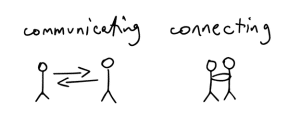Have you ever been publicly called out or shamed, leaving you feeling defensive and unsure of how to respond? It’s a jarring experience, one that can linger far longer than the interaction itself. For many, it highlights a core tension in human interaction—how we ask for what we need and how we respond when others make assumptions about our intentions.
A Brunch Interrupted: When Words Wound
I had a recent experience that brought this into sharp focus. A few weeks ago, my wife Yvette and I invited a new acquaintance, Sean, and his wife to brunch at a bustling local spot called the Pink Blossom Café. What started as a lively, heartwarming conversation turned into an unexpected moment of reflection when a stranger’s approach to making a request showed just how differently situations can unfold depending on how we choose to communicate.

Yvette paused for a moment, her expression a mix of confusion and anger. The comment caught us off guard, and the mood at our table shifted slightly. I looked at the woman, and said, “that just isn’t very kind.” Sean, in a calm and steady voice, simply said, “We’re in public.” His composed response stood in contrast to the sharpness of the woman’s remark.
The truth is, I’ve had my fair share of moments in life where someone has told me to “quiet down,” but seeing someone direct that same shaming energy toward Yvette hit me differently. And as I reflected on the interaction later, I realized the issue wasn’t about whether Yvette’s voice had carried too far or whether the woman simply wanted some peace and quiet. It was about how we choose to ask for what we need, and the impact that has on others.
Shame vs. Vulnerability: The Choice That Shapes Connection
The woman’s desire for quiet wasn’t unreasonable, but her approach was. By assuming Yvette was intentionally being loud, her reaction became shaming rather than understanding. Shame rarely inspires cooperation—instead, it triggers defensiveness.
If she had said, “I’m sorry to bother you, but could you lower your voice?” the outcome might have been completely different. Vulnerability and kindness invite connection, while judgment shuts it down.
From Criticism to Collaboration: Lessons for Leaders
This same principle applies in leadership. Criticizing employees as “lazy” or “stuck in their ways” erodes trust and disengages teams. On the other hand, leaders who ask for input with vulnerability foster collaboration. For example, “I’ve noticed we’re missing deadlines. How can I support you?” opens dialogue and builds trust.
Three Steps to Kind Communication: Asking Without Shaming
Here are three tips to communicate effectively and kindly, whether in personal or professional settings:
- Own Your Need – Frame your request around your feelings. Focus on “I” statements, not blame.
- Choose Kindness – Speak calmly and with compassion to encourage cooperation.
- Lose the Armor – Be open about your needs instead of resorting to judgment as a defense mechanism.
The Power of Vulnerability: Why Kindness Wins Every Time

Next time you need something, pause and consider your approach. Replace judgment with kindness, and you might be surprised at the results. What’s one area in your life where you can practice asking with vulnerability instead of shaming?



This was a terrific article, Misti! I am sure everyone has something to gain from your insights and suggestions!
Thank you, Linda!